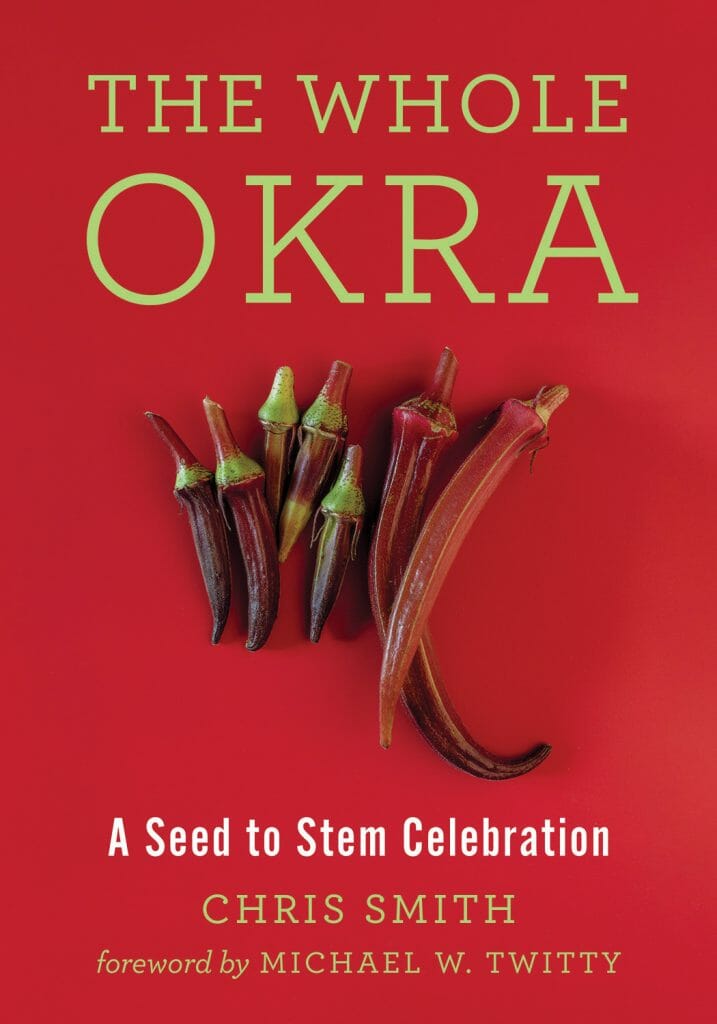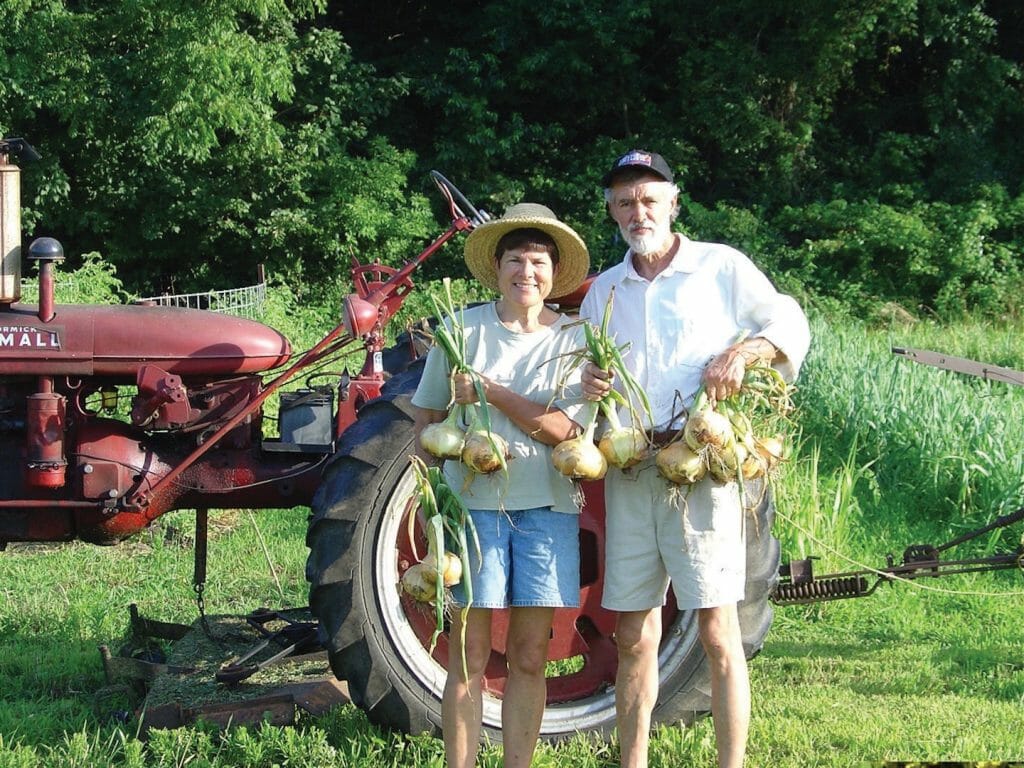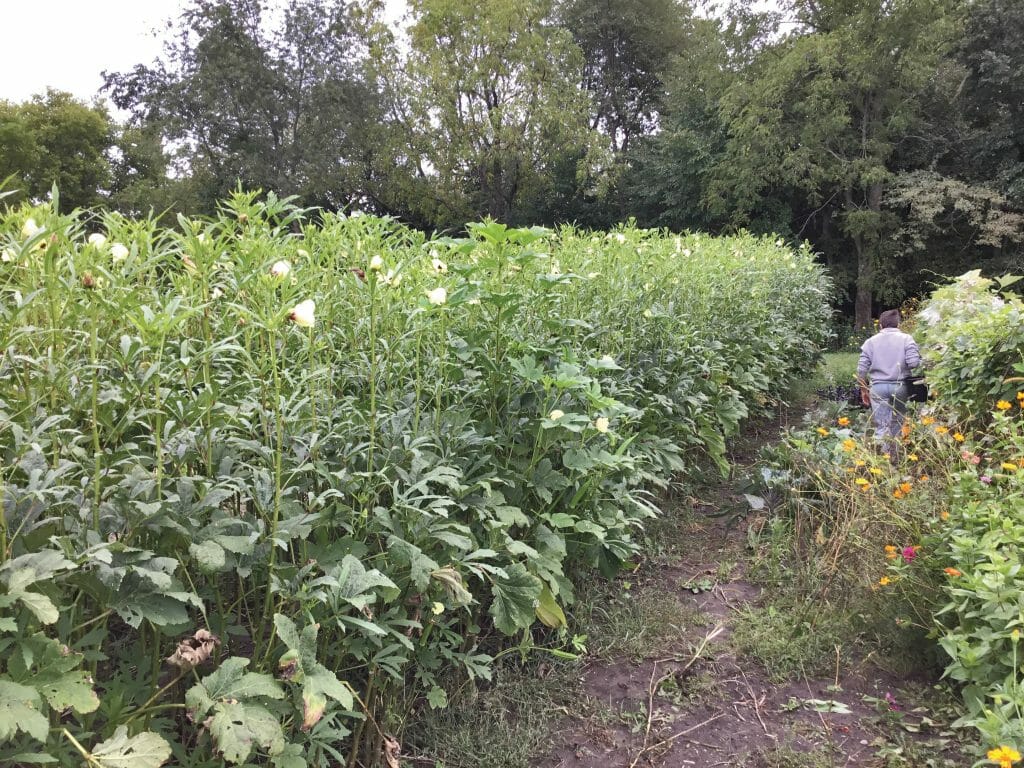Review of: “The Whole Okra: A Seed to Stem Celebration”
Review by Lonna Nachtigal
There are few things better than having a good book to enjoy on a cold winter day. Along with thumbing through the seed catalogs that catch my interest at the beginning of the year, I have been reading “The Whole Okra: A Seed to Stem Celebration” by Chris Smith, who I found to be an engaging writer, fellow gardener, okra lover and culinary explorer.
 Chris Smith is originally from England. That seems an unlikely beginning for an okra enthusiast but he has obviously blossomed with this book. He now lives in North Carolina and works with Sow Truth Seed in Asheville, North Carolina, and is the executive director of The Utopian Seed Project. He also serves on the boards of The People’s Seed and Slow Food Asheville.
Chris Smith is originally from England. That seems an unlikely beginning for an okra enthusiast but he has obviously blossomed with this book. He now lives in North Carolina and works with Sow Truth Seed in Asheville, North Carolina, and is the executive director of The Utopian Seed Project. He also serves on the boards of The People’s Seed and Slow Food Asheville.
“The Whole Okra” explores the whole plant and all its possibilities. Chris not only talks about eating the okra pod but also okra’s wide-ranging – and sometimes surprising – uses: in cosmetics; as a thickener and emollient; as a tasty green; and as fiber for paper and cordage; as a coffee substitute; and to make tofu and tempeh. He also describes how the okra seeds can be used for oil and flour, and the pods can be used as a holiday decoration for your Christmas tree.
As he writes about all of these uses – and more – he paints a portrait of a tough, widely adapted plant that could use much more of our attention. As we look for resilient and sustainable crops to address our changing climate, okra may just be worth some serious consideration.

Lonna Nachtigal and Joe Lynch hold onions harvested on their namesake farm, Onion Creek Farm, near Ames.
Okra is classified as Abelmoschus esculentus. The genus name, deriving from Arabic and meaning “father of musk,” refers to the scent of the seeds. Esculentus means “succulent or full of food.” Okra is a member of the mallow malvaceae family, which includes cotton, cocoa, balsa wood and hibiscus.
This opens up a world of possibilities when you think of the many useful characteristics possessed by this family of plants. Even if you don’t grow okra to eat, you can’t deny that the hibiscus-like flower that comes to bloom, dies and starts to set a pod each day is beautiful to look at.
The author of this book does a fine job of addressing what he calls the “S” word – the slime factor. Chris argues that the okra’s reputation as a distained and slimy vegetable is extremely unjust. Okra is enjoyed in many cultures around the world. And no matter where you are, it seems everyone has an opinion about okra. Here in the United States, there seems to be a great north-south divide. We either love it or hate it.
I’ve been growing and selling okra for many years at the Ames Main Street Farmers’ Market, and I’ve heard all sorts of opinions about this vegetable. For some reason, okra brings out passions and opinions that one doesn’t find, say, with a carrot, potato or eggplant.
Chris Smith has a fine sense of humor and he loves stories. At horticultural gatherings and trade shows, he often goes around with a sign that says “Talk to me about okra!” and gets all manner of culinary, garden, scientific and historical information as a result. “The Whole Okra” is a great gathering of facts and fun stuff.
Recipes in this book include everything from okra fries to Limpin’ Susan to bhindi masala. Also included are recipes for okra pickles, okra seed pancakes and breads, okra greens, kimchi, raw okra salad and okra marshmallow delights. (Remember, okra is a member of the mallow family.) I can’t wait for okra season to begin.
Lonna Nachtigal grows food with her husband, Joe Lynch, at Onion Creek Farm near Ames. She talks about food, farming and many other things every week with her co-host Donna Prizgintas on the “DonnaLonna Kitchen” radio show, which airs on community radio KHOI-FM 89.1, or khoifm.org.

